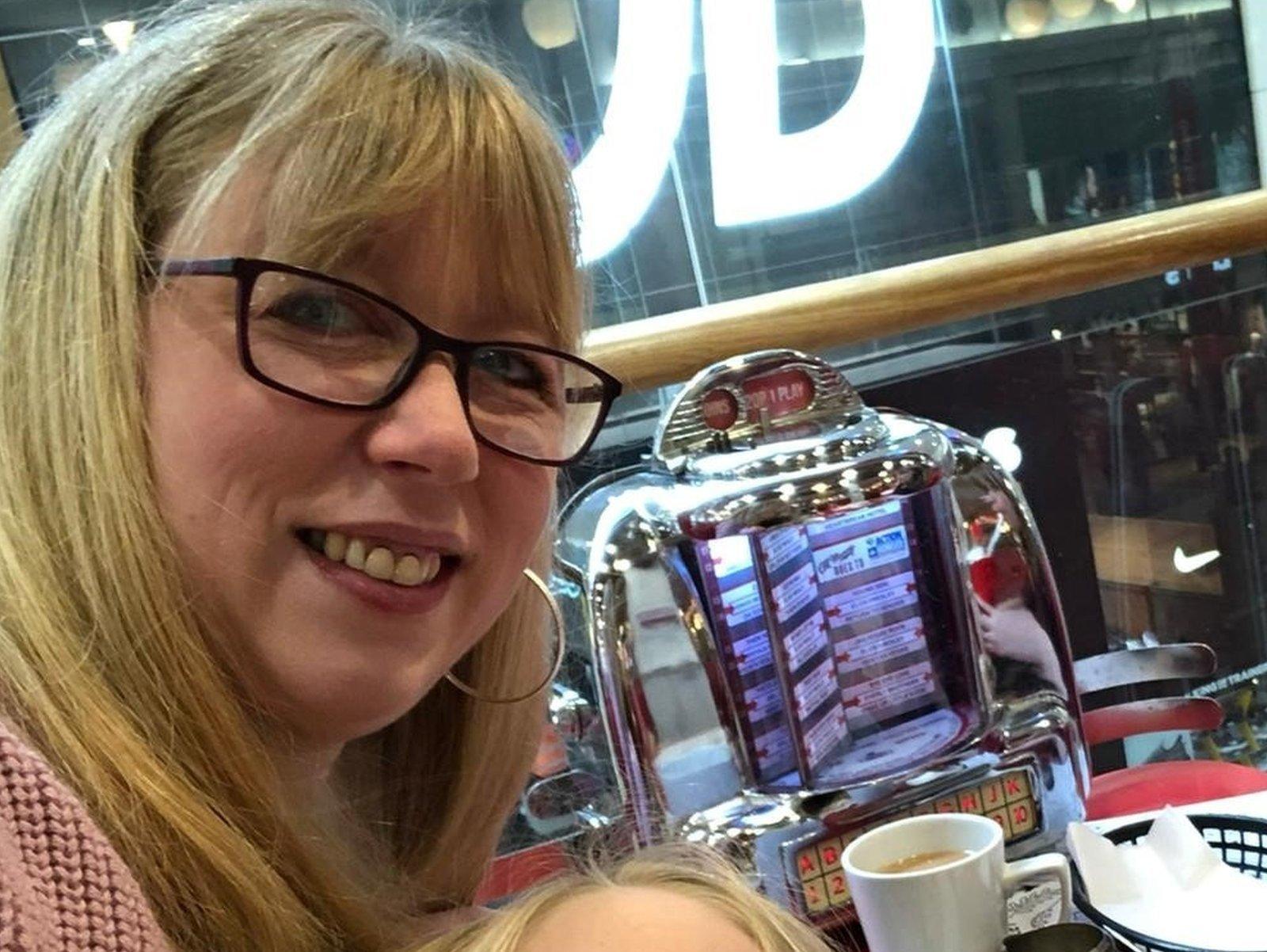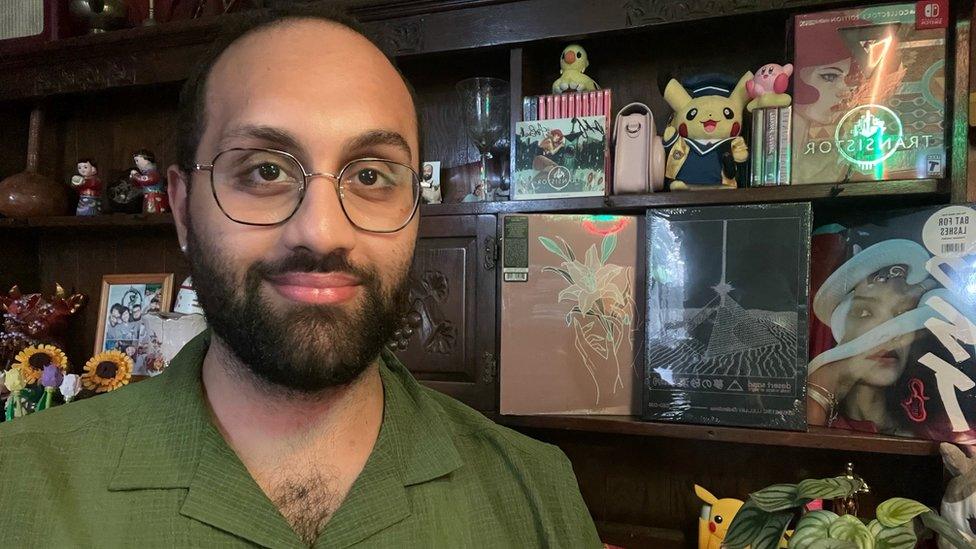Cost of living: The people who can't stop spending
- Published

Claire has borrowed thousands of pounds, but still splashed out recently on a Fitbit, an exercise bike and a trip to Butlins.
"Things are getting more difficult every single day," the single mum-of-two admitted. "And yet I'm not putting money aside, I am spending it."
New research seen by the BBC suggests 25% of people are similarly stretched, but reluctant to stop spending.
The Grant Thornton and Retail Economics report surveyed 2,000 UK adults.
Claire, who lives in Norfolk, earns around £16,000 a year through various jobs in the education sector.
She has borrowed £6,000 to help make ends meet, and knows that she should be trying to pay that back, in addition to saving a bit every month given the rising cost of living.
But she said this rarely happens, because she's prioritising spending on treats for her family after a tough few years during the pandemic.
"My income fluctuates, but when I have a bit more, I do spend it rather than save it," she said.
That has included spending £100 on a foldable exercise bike and £430 on a weekend trip to Butlins holiday resort over the school holidays.
Claire said she does feel "guilty" for spending on non-essential items, particularly given the rising cost of petrol and food. But after two years of Covid restrictions, she feels like the family deserves it.
"Although I am squeezed, I don't want to compromise on the opportunities and experiences that the kids have," she said.
"I feel, if I didn't keep spending on these small things, these little treats - small things for me, slightly bigger for the kids - then we'd just be really miserable."

Although paralegal Joseph Hussain is earning a good salary he said he struggles to stick to his monthly budget.
Joseph Hussain, a paralegal and student from London, recently spent £300 on rare vinyl which, he admits, "I didn't really need".
The 27-year-old, who earns £27,000, sets himself a monthly allowance but said this quickly goes on petrol, food and other essential items.
So he turns to credit cards and buy-now-pay-later companies to fund purchases, which recently included a whole new wardrobe, a Lego bouquet, video games.
"I can't really describe it, I think you just get into this mindset of, well, 'I've already spent so much this month, so I have permission to spend a bit more'," he said.
Joseph admitted he does question whether he should be spending on these items, given the soaring cost of living but doesn't want to miss out on things that bring him joy.
"There's no way on earth I need these plastic Lego flowers or stuff like that, it's just that I very much enjoy them, they make me happy and therefore that's my philosophy in general," he said.
Squeezed spenders
Claire and Joseph's experiences are not unique, according to new research by Grant Thornton, an accountancy firm, and Retail Economics, an economics consultancy.
The research revealed one in four adults in the UK feel they are financially stretched, but are still reluctant to let worrying about the rising cost of living impact their spending habits.
These "squeezed spenders" recognise the need to cut back some of their spending but generally prefer to borrow, dip into savings or use buy-now-pay-later schemes, rather than allow money worries to get in the way of purchases.
Any discretionary income is typically spent on non-essential items, with a lack of willpower cited as the main barrier to saving more regularly.
"This group of squeezed spenders is interesting, precisely because it's counterintuitive," Richard Lim, head of Retail Economics, told the BBC.
"These people realise their personal finances are under pressure, but at the same time, they really want don't want to cut back and so they carry on spending, including on things that aren't essential."
Mr Lim said that while some people in this category have a carefree, even frivolous attitude to their spending, others feel they have no choice but to rely on savings and dip into debt.
"It's about protecting a minimum standard of life for their children and for themselves," he said.
"The concern is how much is this simply deferring financial hardship into the future," he warned.
Cost of living crisis
Prices in the UK are currently rising at their fastest rate for 40 years, with soaring food, petrol and energy bills putting pressure on household finances.
While one in four adults were identified as "squeezed spenders", others are making drastic cutbacks to offset sharp rises in their everyday living costs, according to the research.
The data show just over a third of UK adults are financially distressed and plan to cut back across most, if not all, of their non-essential spending.
Another quarter are seen as "comfortably cautious" - consumers who are financially secure, but still worry about the cost-of-living crisis, choosing to cut back across some of their spending as a precaution.
Only 14% of households are financially immune, with no plans to cut back their spending.
Taken as a whole, households are set to cut back almost £25 billion worth of non-essential spending this year, the research found.
Clothing and footwear are at the top of people's cut back list. But consumers are more reluctant to miss out on holidays, with the report suggesting strong pent-up demand for holidays after two years of travel restrictions due to the coronavirus pandemic.
The survey, which heard from adults across the UK, was carried out at the end of May.

Do you owe money but keep on spending? Share your experiences by emailing haveyoursay@bbc.co.uk, external.
Please include a contact number if you are willing to speak to a BBC journalist. You can also get in touch in the following ways:
WhatsApp: +44 7756 165803
Tweet: @BBC_HaveYourSay, external
Please read our terms & conditions and privacy policy
If you are reading this page and can't see the form you will need to visit the mobile version of the BBC website to submit your question or comment or you can email us at HaveYourSay@bbc.co.uk, external. Please include your name, age and location with any submission.
Related topics
- Published12 July 2022

